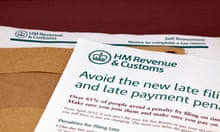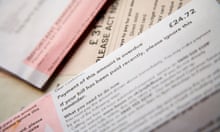British households repaid the most money borrowed on credit cards and loans in 2020 since records began almost three decades ago, as consumers cut back spending during the coronavirus pandemic.
Figures from the Bank of England show £16.6bn of net repayments on credit cards, personal loans, student borrowing and car finance last year – the most repaid since 1993 and the first annual net reduction since 2011, when the UK was still recovering from the financial crisis. Consumers had racked up £13.2bn of extra debt in 2019.
As many people stopped commuting to work and cut their spending on retail, foreign holidays and leisure during repeat lockdowns, the Bank said the annual consumer credit growth rate had plunged to -7.5%, the weakest on record.
During the usually pivotal pre-Christmas shopping month of December, households made repayments worth £1bn. This followed more substantial months for paying off credit card and loan balances earlier in the pandemic, with more than £7.2bn repaid during the peak month of April amid the first Covid lockdown.
The latest snapshot comes as the pressure from the latest lockdown hits consumer spending, further dragging down the UK economy after almost a year under Covid restrictions and as infection levels remain high.
In a sign of the impact on businesses as consumers saved money, borrowing from banks by companies soared to a record £43.3bn as firms battled to stay afloat. The amount raised on the financial markets – from selling stocks and bonds – also rose to a record £52.6bn.
The chancellor, Rishi Sunak, has faced growing calls to launch a renewed package of financial support for businesses and workers hit hardest by the pandemic, including those in travel, retail and hospitality. But while the Treasury plans to refresh its coronavirus response, the chancellor has also suggested that households saving money during the pandemic could help to kickstart the economy anyway as lockdown measures are relaxed.
Sunak believes consumer spending could boom after many people saved money in lockdown while continuing to work from home or receiving income from furlough, arguing that looser restrictions would enable the release of pent-up demand.
Official figures show the UK’s households savings ratio – a snapshot of household savings as a proportion of disposable income – soared to a record high of 27% in June last year, and has remained at historically high levels since.
However, these aggregate figures obscure intense pressure for people bearing the brunt of the pandemic, as millions lose their jobs or suffer loss of income. Millions of people have fallen behind on rent, bills and debt repayments, while destitution levels are expected to double in the wake of the crisis – with an estimated 2 million families likely to struggle to make ends meet amid the coronavirus recession.
Almost 9 million people, many of them among Britain’s poorest, were forced to increase their borrowing last year to cope with the pandemic, according to official figures illustrating the damaging effect of the first two lockdowns.
Highlighting how some households’ finances are in a stronger position during the crisis, the figures from the Bank also showed the highest number of new mortgage approvals were made in 2020 since immediately before the 2008 financial crisis.
The property market boomed in 2020, with average prices rising to a six-year high. The market tends to be driven by higher-income buyers and older individuals, rather than low-income and younger workers who tend to work in sectors of the economy harder hit by the pandemic and more often live in rented homes.
The Bank said that despite a collapse in approvals in May during the first lockdown, mortgage approvals for house purchases in 2020 reached 818,500, the most in a year since 2007, and up from 789,100 in 2019.










